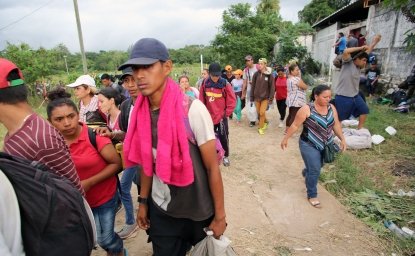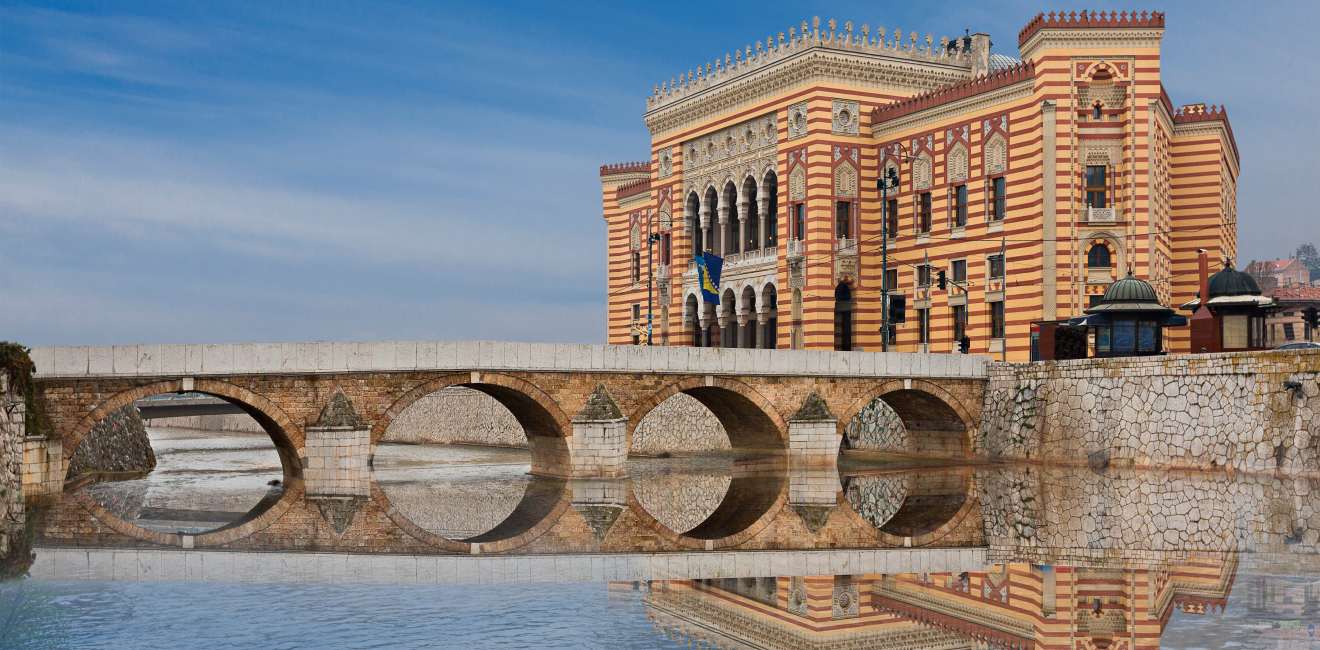There is contestation over the idea of a Bosnia-Herzegovina as much as there is about its actual existence. That proposition on either count ought to be worrying some 25 years after the armed conflict that ravaged Bosnia. On both counts together, however, it raises fundamental questions about the kind of peace reached in Dayton, Ohio between Bosnia’s war-time protagonists. That ethno-nationalist and elite-led conflict pitted Bosniaks (Bosnian-Muslims), Bosnian-Croats (Catholics), and Bosnian-Serbs (Serbian Orthodox) against one another in manifest contradiction to a Bosnian society accustomed across centuries to shared living and ‘unity in diversity’.
The success of the Dayton Peace Agreement, and Annex IV which contained Bosnia’s constitution, has a single marker of ‘success’ amongst its strongest champions: it has ensured no further violent conflict between the three so-called ‘constituent peoples’ in Bosnia (Bosniak, Bosnian-Serbs and Bosnian-Croats). That indeed would be worthy of championing if that marker did not carry with it an inescapable and ever-present risk: renewed violent conflict. Beyond violent conflict are other existential issues: endemic corruption among elites, severe political and economic stagnation exacerbated by ethno-nationalism, and little to no political legitimacy of elites representing the people. The questions that arise are: how existential are the risks? What role, if any, does the current Bosnian constitution play? How might current and future risks be mitigated? That is partly the subject of my new book, A Constitution of the People; and How to Achieve It.
The past year has brought existential risks to Bosnia to the fore for several reasons. Political elites from Republika Srpska – one of the Bosnia’s two entities comprising 49% of the territory – continue to compete with one another by actively working towards unilateral secession supported by predatory nationalists from Serbia, Croatia and distant Russia. Serious proposals to reform Bosnia’s constitution, all led by elites from ethno-nationalist political parties, seek to more deeply entrench the same ethno-nationalist elite interests and encourage further division and separation by perpetuating calls for ‘group rights’ over individual rights. Reform, which ought to be driven by inclusivity, necessity and a human rights-led approach, remains elusive: many ordinary people and minorities (citizens who do not declare themselves as members of any of the three constituent peoples) are locked out of the political process completely. Many decisions of the European Court of Human Rights requiring equality and non-discrimination in respect of political participation of Jews, Roma and other minorities remain unimplemented. Meanwhile, member states of the EU (even) are privately sharing ‘non-papers’ supporting the idea of redrawing borders in southeast Europe, further segregating Bosnia, and/or partitioning Bosnia along ethnic lines; precisely the kind of elite-led designs that prompted the 1992-1995 armed conflict. The EU commits itself in public, however, to the territorial integrity and sovereignty of Bosnia as a prospective member at some undefined juncture in the future.
Bosnia is in a frozen conflict and the United Nations and Bosnia’s High Representative has finally accepted a proposition long argued by experts. Ethno-nationalist elites maintain conflict in the post-Dayton constitutional structure by keeping unresolved core post-war issues such as territorial control, population return, and ethno-national appropriation of the civic, social and cultural space as much as the political space. The High Representative goes further still and declares that: “the multi-ethnic and diverse society that existed prior to the conflict has all but disappeared.” Bosnia’s diverse society might not have disappeared, but its constitutional structure certainly works to suppress it and disincentivise collective popular mobilisation.
Bosnia’s constitution was imposed upon Bosnia’s citizens by domestic and international elites. The people had no say in its creation on the presumption that they harbored “ancient ethnic hatreds.” The constitution, negotiated as it was, by the architects of the war, has helped institutionalize division and in the process debilitated the country. The constitution ensures the equality of three ethnic groups through strict rules on elite power-sharing. Equality of these groups is at the expense of the equality of individuals and others. Vetoes, strict ethnic quotas and decentralized powers accorded exclusively to the political elites of three constituent peoples, are all at the expense of individuals or groups not specifically recognized by the Bosnian constitution. For instance, a Jew, a Roma, a Bosnian Muslim from Republika Srpska or a Bosnian Serb from the Federation cannot become President. Keeping the country barely running is expensive. With only 3.53 million inhabitants, Bosnia has the highest number of presidents, prime ministers, and ministers per capita in the world. Up to 55% of the entire State budget, some three per cent of the country’s GDP, is spent on government administration. All efforts at reforming the constitution have been elite led and all have failed. As leading commentators have succinctly put it: this is a “peace cartel.”
Political elites say they faithfully represent their respective segregated ethno-national communities while paradoxically remaining isolated from any meaningful engagement with them. The irony is that much of the segregation occurred as a result of international crimes. The controversial issue is this: if the people of Bosnia do not harbor the supposed ancient hatreds but have a political culture that is democratic, tolerant and accommodating, then could – and should -- another constitutional future be envisaged? What could persuade ethno-national elites who benefit by the current institutional structure to give it up? Could the people be the architects of their own democratic destiny within the revolving doors of constitutional reform?
The narrative of immutable ancient hatreds has never been supported by Bosnia’s variegated, multi-ethnic and thousand-year history. For much of their history, the Bosnian people have come under the strong influence of foreign powers depriving them of agency. Despite that, Bosnian history is, in fact, predicated on participation, accommodation and tolerance. The contrary view is not supported by the evidence, including data relating to people’s political preferences, since at least the late 1980s. If the people are momentarily apathetic, intransigent, or intolerant, this is because that orientation is a consequence of the armed conflict rather than being endemic to the political culture. Later that orientation has been strengthened directly by the constitutional structure agreed—or rather imposed—by Dayton. The deprivation of popular agency, as the nature of the constitutional settlement, has effectively been a local elite and international co-production to the present day. Either way, this Dayton-driven emanation of poor political participation has no reason to remain fixed or unchanging. There is always a possibility for change where there is the capacity, as there is in Bosnia.
If A Constitution of the People is right about Bosnia’s culture – that is, its people are increasingly moderate, accommodating and inclined to democratic political participation and snapshots of this are ever-present across the country – then there is a discrepancy between elite preferences and the people’s preferences in the space where the rules of the game reside. That might allow for, indeed necessitate, much needed and innovative change to arrest elite-led polarisation and division.
Such change would challenge the acceptance and proliferation of overly legalistic and/or entrenched constitutional models. Those models are largely characterized by abstract, prescriptive, and mechanical rules created in a single constitutional moment often by elites (but in the name of the people). They have gained almost universal acceptance in both developed countries and countries transitioning to democracy. But these models have sometimes created and reinforced the very divisions and polarisations that they were intended to resolve (by ignoring context, history and politico-socio-cultural markers). If, however, the political culture of the people is conducive to accommodation, trusting of difference, and democratically oriented, then introducing the capacity to change the constitution need not be feared.
One method is a revolving constitution which would subject parts of the existing constitution to greater civic involvement and input (referendums, civic initiatives, deliberative assemblies) on a fixed and regular basis so the Bosnian people can determine what, if anything, should change. In Bosnia, informed public participation and deliberation (simultaneously and concurrently in cantons and municipalities) in a constitutional design process, on a fixed and repeated basis, with some procedural safeguards, could introduce a flexibility in political life in Bosnia that was, perhaps still is, present in long-evolved democratic polities like Britain. The capacity to change the constitution every new generation (the revolving constitution) could allow, with careful calibration, the possibility of catalysing evolutionary outcomes in the short run. As a minimum, no one would be worse off and, at best, everyone will have the opportunity for a better constitution than is currently possible. People and elite preferences could truly coincide.
Bosnia cannot afford to wait to evolve towards a new constitutional settlement. One unfortunate and very real pathway out of the current deadlock in Bosnia is collapse and the other is a return to violent conflict: both serious risks considering recent events. Extremely partisan efforts towards recent electoral reform (with international support) merely forestall those pathways in favour of further elite entrenchment. If the people in Bosnia are much more accommodating than the ethno-nationalist political elites representing them (as A Constitution of the People demonstrates they are), then the presumption upon which the current constitutional arrangements were built were not only incorrect. They help perpetuate a collective socio-economic and political malaise from which there is, seemingly, no escape.
The current debate in Bosnia is on reforming the content of the constitution by tweaking or changing specific constitutional provisions only. The paradox is that reform continues to be unlikely (or tended towards the lowest common denominator) given the special constitutional guarantees accorded to the three constituent peoples. There are few incentives for political elites to compromise their intransigent positions; they continue to benefit guaranteed by external money and security guarantees. If anything, the reality is the opposite. Any attempt at reform by one group of elites is seen as an attempt to undermine one group at the expense of the other (at least that is how ethno-nationalist leaders present proposals for reform to their respective ethnic constituencies). It is a classical “beggar thy neighbor” problem.
The institutional logic belies where the preferences of the people lie; any political elite that wishes to champion a future which is inclusive, tolerant, and accommodating risks serious censure because of the current constitutional set-up. But the possibility of amending the constitution with genuine civic involvement, with incentives provided by external actors, could set in motion a process rather than determine an outcome. It is a historic opportunity for peacemakers at both home and abroad: to truly create a process, whereby actors are incentivised to pursue moderate, inclusive, and accommodating reform. The process, led by Bosnians themselves, could alter political action and behavior of both the people and political elites. Assessing and understanding the preferences of political elites and the people has valuable explanatory power as well as predictive potential; they allow us to think about how Bosnia might become, and be nudged into becoming, a closer approximation of a fairer, more just and more democratic state and society. Bosnia might even set a standard even for other plural, multi-ethnic polities to follow.
Author


Global Europe Program
The Global Europe Program is focused on Europe’s capabilities, and how it engages on critical global issues. We investigate European approaches to critical global issues. We examine Europe’s relations with Russia and Eurasia, China and the Indo-Pacific, the Middle East and Africa. Our initiatives include “Ukraine in Europe”—an examination of what it will take to make Ukraine’s European future a reality. But we also examine the role of NATO, the European Union and the OSCE, Europe’s energy security, transatlantic trade disputes, and challenges to democracy. The Global Europe Program’s staff, scholars-in-residence, and Global Fellows participate in seminars, policy study groups, and international conferences to provide analytical recommendations to policy makers and the media. Read more

Explore More
Browse Insights & Analysis
Change in the Ballot Box in Africa

You Can’t Deport Your Way Out of the Problem

US Ties Its Hands in Fight Against Organized Crime

